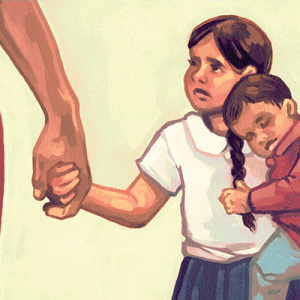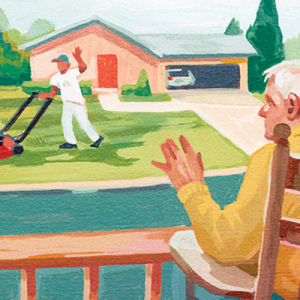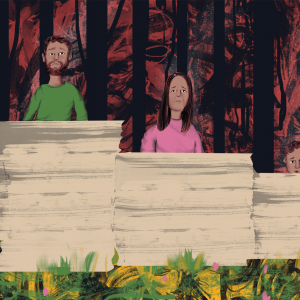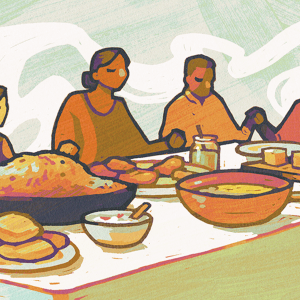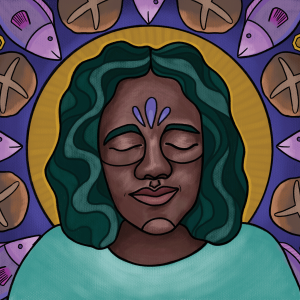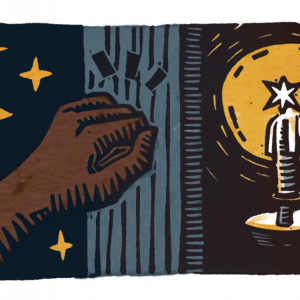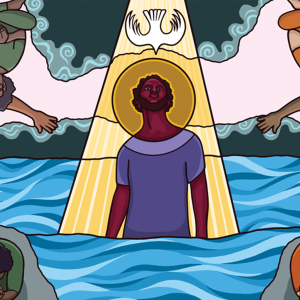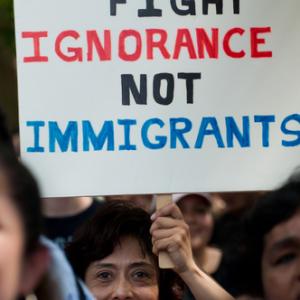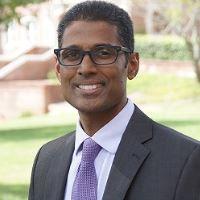
Dr. Raj Nadella is the Samuel A. Cartledge associate professor of New Testament at Columbia Theological Seminary in Decatur, GA. His research and teaching interests include Mikhail Bakhtin and Biblical Studies and Postcolonial Readings of the New Testament, especially the parables of Jesus. His research focuses on New Testament perspectives on issues of economic justice and their ethical and theological implications for the church and society today. His first book, Dialogue Not Dogma: Many Voices in the Gospel of Luke was published in 2010. Dr. Nadella is a member of the Presbyterian Church (USA).
Posts By This Author
Treasure Every Child
THERE IS MUCH anticipation in the air. During Advent, we eagerly await the Christ child among us and all the blessings and transformations this infant brings. Our readings during this season remind us of the Christ child’s vision for our world — and of God’s power to upend existing political orders. This is the child whose mother proclaims that he will “cast down the mighty,” “lift up the lowly,” and change the course of history for God’s people. We welcome the arrival of new life in Christ, imbued with hope and reminders that life is never fully defeated by empire’s death-dealing designs.
But this Christ child comes in many guises. This child appears as an unhoused person, a racial other, an incarcerated person, a foreigner. Will we receive every child of God as we receive the Christ child and honor their hopes and full potential? Will we give to all of God’s children the gifts of our time, energy, joy, and relationship so that our communities become hospitable places for the Christ child and every child?
‘Neighbor’ Is a Moral Concept
November reflections on scripture from the Revised Common Lectionary (Cycle B).
ELECTIONS ARE UPON us. The electoral choices we make, or do not make, have far-reaching implications both for this country and others, for us and future generations.
Four years ago, I gave up my Indian citizenship and became an American citizen to vote in the U.S. general election in 2020. At that time, it seemed like the most important election in my life — and I wanted to have a say in it. Astonishingly, the stakes for elections this November feel as anxiety-inducing and consequential, if not more, than four years ago.
Such fears notwithstanding, as people of faith we vote from a place of hope, not despair. As Christians in a powerful nation, we have a particular responsibility to vote, not just for ourselves but with sensitivity to the Body of Christ around the world. Voting in democratic systems such as ours models a nonviolent transfer of power. We vote for ourselves and for our neighbors. We vote because elections afford us an opportunity to pursue a just and fair future for our communities and country. Elections can give legislative framework to a full range of our faith commitments; ensure that our public institutions serve the poor rather than exploit them; and shape our country into the multiethnic, multireligious, economically equitable democracy it is intended to be. Our votes can contribute to the transformations we envision.
This election season, all people of faith and good conscience must reflect deeply, organize effectively, and vote diligently to elect competent and compassionate leadership. May we choose our leaders wisely.
Justice, but on Whose Terms?
October reflections from the Revised Common Lectionary (Year B).
THIS SUMMER, THE Biden administration issued an executive order imposing harsh limits on those seeking asylum at the U.S.-Mexico border and intensified deportations of those who no longer qualify to stay in the U.S. In the ensuing debate, many have argued that the new limits violate U.S. laws and treaty obligations. There is genuine outrage about the immorality of denying refuge to those seeking protection on our soil — an act that ignores the role the U.S. has played in fomenting political crises in many of the originating nations. Biden’s immigration policies have been fairly humane; this new policy is disappointing.
Immigration and refugee crises are always subject to becoming weaponized, and they are thus issues of vulnerability for politicians. The former administration demonized immigrants and imposed extremely harsh family separation policies. Refugees and asylum seekers become collateral damage in political partisanship — but these are real families fleeing real threats. Justice should serve the powerless, not the powerful, however well-intentioned the powerful may be. In summer 2013, Congress nearly passed a bipartisan comprehensive immigration reform bill. At the last moment, far-right members of the House of Representatives scuttled years of work. A successful bill would have made immigration far less of a political football and provided immigrants a more stable path to citizenship. Justice should be executed based on the hopes and existential needs of those adversely impacted by unjust structures and policies — both past and present.
Who Tells Our ‘Definitive Story’?
September reflections from the Revised Common Lectionary (Year B).
IN HIS INFLUENTIAL book Orientalism, Palestinian literary critic Edward W. Said articulated the symbiotic relationship between knowledge and power. Said observed that people in power often get to produce knowledge, and they produce it in ways that justify and enhance their privilege. Such a symbiotic relationship between knowledge and power plays out in books, movies, art, and other cultural venues. In the context of European colonialism, Western artists and intellectuals did the empire’s bidding by caricaturing cultures in the global South as barbaric and inferior to European culture. Empires employ such caricatures to justify conquest and advance political and economic interests. Such distortions promote narratives that deflect attention from the mechanisms of conquest and, in many cases, pit colonized communities against each other.
It matters who gets to tell whose story. How they are told and to what end matters as well. Empires continue to manufacture modes of knowledge — in the form of caricatures, false narratives, and single stories devoid of nuance — and weaponize them against the oppressed. This phenomenon of promoting single stories occurs in biblical interpretation too and in the scriptures themselves. As Christians, charged with being “good news” among the oppressed, we can unveil the mechanisms by which dominant groups produce knowledge to advance their own interests. How are we perpetuating single stories or false narratives to the detriment of ourselves and others? It’s a task that requires intellectual acumen as well as intellectual humility.
Gathering Everyone to the Table
August reflections on scripture from the Common Revised Lectionary (Cycle B).
SOME OF MY fondest memories of my homeland, India, are of food, family meals, and big community banquets. My culinary tastes are versatile, but I explore Indian food as often as possible. What a joy to join a table filled with chutneys, biryani, coconut shrimp curry, aloo gobi, raitas, and dal with the scents of citrus, ginger, cardamom, coriander, and cumin inviting us all. Such meals, for me, are not just an act of consuming delicious food but a means of recalling stories and images of home. Many memories are shaped around the tastes and smells of food. Those memories become part of our experiences and shape our identity. Our relationship with food operates on both primal and profound levels. Food fuels our bodies physically, but meals are also where people express themselves. People are creative in their cooking. They send a message through their food.
Food is also a metaphor for social and economic structures in our contemporary contexts as well as in the Bible. Meals are occasions where people either enact inclusion and deep care for others through table fellowship and radical hospitality, or practice exclusion and tell others they are not invited. In that way, food functions as an extension of our values, of ourselves.
From the earliest parts of the Christian story, food is central. Jesus presents himself as the bread from heaven, our liberator. He offers himself as bread — blessed, broken, and shared for the world. He feeds the hungry and enjoins us to do the same, in his name.
Scandalous Wealth
July reflections on scripture from the Common Revised Lectionary (Cycle B).
IN HIS 2013 book The Great Divergence: America’s Growing Inequality and What We Can Do About It, Timothy Noah notes that the personal income of the top 1 percent in the United States began to increase exponentially beginning in 1979, a peak year in what economists call the “Great Inflation” (1965-1982). While there has always been economic stratification in the U.S., the “great divergence” in American’s incomes began at the end of the 1970s, and the wealth gap has continued to grow. In 2019, people in the top 1 percent of income distribution held more than 33 percent of the total U.S. wealth — up from 27 percent in 1989, according to a Congressional Budget Office report. Families in the bottom half held only 2 percent of the total wealth. The U.S. has policies that protect wealth and others that depress wages and hinder affordable housing. This combination increases poverty. Unfortunately, false narratives still circulate about the causes of poverty, blaming the poor and pitting communities against each other.
From another point of view, acceptance of wealth disparity, and the policies that cause it, is a result of failed imagination: We accept increasing wealth disparity because we cannot envision another way. As people of faith, we are called to be God’s prophets and seers — to see the possibilities of God where others cannot. The church’s task is to challenge empire’s narratives about what is possible, to actively cultivate what biblical scholar Walter Brueggemann calls a “prophetic imagination” for a different reality and empower communities to embrace it.
The Paradox of Disruption
June reflections on scripture from the Common Revised Lectionary (Cycle B).
U.S. REPRESENTATIVE John Lewis’ more than 60 years of extraordinary activism unfold in the 2020 documentary John Lewis: Good Trouble. He took his stand on the most critical issues of our times — voting rights, civil rights, health care, and more. Lewis knew firsthand that many systems and practices in our country were undemocratic, designed to benefit the few and to increasingly disempower the many. He refused to let democracy slide backward or normalize the status quo, and he called for positive, creative disruption of bad systems. Lewis’ call for people to engage in “good trouble” used the power of nonviolent disruption to leverage transformative change.
“Disruption” is a buzzword these days in the world of business and technology. Individuals at the forefront of “disruptive technologies” are often hailed as visionaries, regardless of the ends to which such disruptions are employed. In many ecclesial traditions, emphasis is placed on conserving church structures, processes, and hierarchies. This is the nature of institutions that seek to preserve traditions beyond a single generation. However, too much of this runs the risk of ossifying the tradition, such that the next generation sees no value or life in the institution. Ecclesial traditions also need prophetic energy that embraces the power of disruption to create positive change.
Disruption is complex. The lectionary texts this month invite us to see the tensions — while there are things that need to be disrupted, there are others that need to be preserved. These texts present Jesus as a disrupter of oppressive systems but also as a preserver of calm amid destructive storms. In 2024, nearly half the world’s population will vote in a national election — including the United States. As Christians, we are called to be intentional about disrupting oppressive systems and to be vigilant about preserving democratic systems that protect the most vulnerable and secure peace and justice for all.
Called To Be Nature’s Good Neighbors
May reflections on scripture from the Common Revised Lectionary (Cycle B).
DURING THE COP 28 climate change conference in Dubai, participants deliberated at length on the climate crisis and rightly set ambitious goals to address the challenges. As may seem natural, much of the conversation centered on securing a planet habitable for humans. But as Christians we must wrestle deeply with sharing God’s covenant with other creatures. Seeing creatures and the natural world as having no meaning other than how they serve human interest is a failure of human vision. The 2007 documentary Earth poignantly highlighted how an anthropocentric worldview and the human-caused environmental crisis have imperiled other creatures in a miraculously delicate system.
Perhaps out of species self-interest, much environmental work focuses on how climate shifts impact current and future human generations. But as people of faith, we can take a more wholistic view that also demonstrates commitment to the well-being of all God’s creation — animate and inanimate — because all are interdependent. In the context of the climate crisis, corrective justice requires addressing the concerns of communities disproportionately affected by climate collapse, as well as ensuring the welfare of nonhuman creatures. It is incumbent upon us to challenge the anthropocentric lens and champion biocentric approaches that affirm the sanctity of all life and creation. Our scripture readings this month present nonhuman creatures as equal partners on God’s planet and speak forcefully about their right to exist and thrive alongside our human communities. They feature animals dancing in open spaces, frolicking in the sea, and celebrating life in its fullness. Everything in nature reflects God’s glory, participates in God’s salvation, and reminds us of the divine presence.
What Stories Define the Church?
April reflections on scripture from the Common Revised Lectionary (Cycle B).
IN THEOLOGIAN STANLEY Hauerwas’ influential book A Community of Character, he highlights the role narratives play in the formation and identity of a community. Stories have a descriptive function but also a formative function. Stories describe key events in the life of a community and preserve that community’s history. They also shape the community’s worldview and character. Stories influence the community’s ethos and commitments. They drive its actions. Gospel stories testify to the nature of Jesus’ mission and the ethos and commitments of the early church. They foreground Jesus’ character traits, which help shape our own ethical outlook and enable us to imagine an alternative moral space in society.
We live in a fraught political context where Christian identity has become a contested moral space. It’s a space increasingly shaped by dangerous nationalisms that celebrate oppressive power and that depict God in ways that provide theological justification for consolidation of power over others. However, the lectionary texts this month challenge just such depictions of God. They lift up the image of a God who suffers with the suffering rather than a triumphant God exercising domination. They feature characters, including Jesus, who insist that it matters what stories we tell and how we tell them.
What stories do we tell about the church today and how do we tell them? Do such stories shape our legacy as Christians and our moral imagination? How do we continue to tell those stories faithfully and meaningfully, allowing them to shape our lives, even in an era when many Christians are attracted to stories of a militant, oppressive God rather than to God’s motifs of justice?
‘It Is Midnight in the Social Order’
March reflections on scripture from the Revised Common Lectionary (Cycle B).
RARELY DO YOU see powerful people advocate for the benefit of others outside their “own” political or economic group. There is a tendency on the part of the elite to leverage their privilege for their own benefit while disguising it as public good, as the concept of “elite capture” has exposed. And the state is often complicit in reinforcing policies and practices that concentrate resources into the hands of those who already have enough. In a 1962 sermon titled “A Knock at Midnight” (see Luke 11:5-6), Martin Luther King Jr. diagnosed the state of the nation and church saying, “It is midnight in the social order.” He urged the church to respond to the oppressed who “knock on the door,” even when it’s inconvenient. “How often has the church left [people] disappointed at midnight, while it slept quietly in a chamber of pious irrelevancy,” preached King.
Despite decreasing numbers, the U.S. church wields enormous political and economic power. This month’s readings showcase people — the powerful and the not so powerful — who exercise their agency for the good of those who seemingly have little to offer in return. The texts highlight the church’s moral and theological imperative to employ its power to open the door to the ones who desperately knock. Will the church that gathers in the name of Jesus ignore the state’s complicity in oppressive structures or will it act as the “conscience of the state,” as Dr. King urged? Does the church privilege its own comfort or does it attend to the vulnerable, even at the risk of its own interests? King concluded, “the greatest challenge facing the church today is to keep the bread fresh and remain a Friend to [humanity] at midnight.”
What Change Would You Make?
February reflections on scripture from the Revised Common Lectionary (Cycle B).
THE CENTRAL CHARACTER in Octavia Butler’s short story “The Book of Martha” lives at a time of heightened human oppression and environmental crisis. Martha encounters God, who invites her to help remedy the situation, to make sure “that people treat one another better and treat their environment more sensibly.” Martha’s fear leads her to believe that such an encounter with God was a dream, more likely a nightmare. She insists that it is impossible for her to affect change and asks God to fix things. God replies, “What change would you want to make if you could make only one? Think of one important change.” Perhaps this is a question for all of us.
Martha’s encounter with God turns into something beautiful and allows her to see new possibilities to change the world. Her eventual move toward facilitating the kind of world she envisioned is made possible by her belief in her own agency — her ability to generate novel ideas and take measurable steps to realize them.
Too often justice is described in terms that are broad and abstract. The realization of justice requires concrete steps. Sometimes we despair when we fail to accomplish substantive change, despite our sacrifices and work. This is part of the human condition. But we are also called to actively hope and then take the steps that are ours to take. An alternative reality is possible when we allow ourselves to be transformed by God’s presence working in earlier models of liberation. We are invited to think creatively together about what is possible and pursue it passionately.
A Year of Transformative Leadership
January reflections on scripture from the Revised Common Lectionary (Cycle B)
THERE IS A saying in Telugu, my mother tongue: “The fence has devoured the garden.” I find it a useful phrase in this year when the United States embarks on a federal election cycle that will test the strength of our democratic institutions and may well damage their integrity. The same leaders entrusted with the power to safeguard the interests of the people (“the fence”) have instead undermined them. Growing economic inequality continues to dehumanize individuals and entire communities. Women, Black, brown, refugee, and LGBTQ people increasingly feel at risk in light of recent court rulings. Leaders expected to provide vision in times of crisis, whose mission is to “protect the garden” of democracy and civil life, appear to be actively “devouring” it. And accountability has been in short supply.
How do we facilitate transformative changes that allow individuals and communities, especially those at the margins, to realize their dreams and flourish? At a time when scriptures (such as Romans 13) are used to prescribe uncritical loyalty to authorities, what are some strategies for holding those authorities accountable? This month’s texts invite us to identify and nurture leaders who can see things differently, offer a generative vision, and undertake radical changes. They exhort us to empower a new generation of leaders who are working collaboratively and serving the people with integrity, and who privilege the interests of the community over their own.
Jesus Wants You to Be Skeptical of the System

Image via vichie81 / Shutterstock.com
A recent study published by the Pew Research Center offers some interesting data about economic inequality in the United States. In 1982, the top one percent of families took in 10.8 percent of all the pretax income. The bottom 90 percent got 64.7 percent. By 2012, it was 22.5 percent for the top one percent and 49.6 percent for the bottom 90 percent. In a more disturbing trend the top one percent owned 35 of all the personal wealth in 2010. The bottom fifty percent owned just five percent.
Reorienting Ourselves to the Earth
The accelerated pace of climate change deterioration in recent decades is highlighted in the report by the Intergovernmental Panel on Climate Change that was released in December 2013. This report highlights the alarming rates of carbon emissions in recent years and the massive disruptions to the nature that occur as a result. It warns that the disruptions could affect all areas of life and endanger the world’s food supply itself. The worst is yet to come. All this might sound a bit apocalyptic.
Acts 2:14-32 posits a similar scenario. Luke’s Peter predicts the signs that will occur in the last days (vv. 19-20). The Sun will turn into darkness and the moon into blood. There will be blood and fire and smoky mist. Joel 3, Luke’s source text behind these verses, was intended as a warning about potential disturbances in the natural order. Joel posits such calamities as consequences of human wickedness and calls on the people to alter their ways. Peter warns that such last days are about to arrive. They will be marked by disturbances in the natural order and terrible signs that will precede the day of the Lord. Interestingly, people in Jerusalem have already witnessed such (un)natural phenomena during the death of Jesus (Luke 23:44-45).
Acts 2 parallels the account of disruptions in the nature with the account about the death of Jesus (2:19-24).
On Scripture: Fear and Wisdom In The Immigration Debate
They have many labels. Undocumented immigrants. Illegal Immigrants. Illegal Aliens. Wetbacks. Jan Brewer, the governor of Arizona, recently suggested that most of them are “drug mules.” Some have even called them “terrorists.” But few are known by their real names or treated as people with real lives.
Most of them live at the edges of the society, under inhumane and dangerous conditions, often separated from their loved ones. For some it may be a choice. However, a vast majority of the 11 million undocumented immigrants in the U.S. are driven to such extremes by factors beyond their control — political crisis, drug-related violence, famine, or eviction from their own homes at gunpoint. Theirs is a story of displacement, of being forced to flee their homes and take risks few would under normal circumstances. They are victims, not the offenders they are often made out to be. Still, for many, it is a story of being treated by the border security as violent criminals, being stripped of their clothes and dignity and separated from their families and traumatized in detention centers. It is also a story of ostracizing and exploitation by parts of the society. The labels and stereotypes about them “otherize” them in ways that prevent their full participation in the society. Injustices like these are the reason why NETWORK’s Nuns On The Bus have been touring across the country speaking out for immigration reform.
